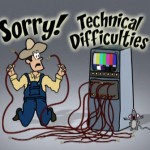 The sermons, interviews and radio programs (available by clicking on the audio tab above) were down for a few days, due to technical difficulties, but I am pleased to say that they are now functioning properly.
The sermons, interviews and radio programs (available by clicking on the audio tab above) were down for a few days, due to technical difficulties, but I am pleased to say that they are now functioning properly.
Thank you for your patience.

 Dr. R. C. Sproul Saint Augustine was cynically asked, “What was God doing before He created the world? Augustine’s alleged reply was: “Creating hell for curious souls.”
Dr. R. C. Sproul Saint Augustine was cynically asked, “What was God doing before He created the world? Augustine’s alleged reply was: “Creating hell for curious souls.”
The reply was, of course, tongue-in-cheek. The Bible doesn’t speak of such a special work of divine creation before creation itself. But Augustine’s bon mot had a serious point that warned against idle speculation of God’s activity in eternity.
However, quite apart from speculation, the Bible has much to say about God’s activity “before” the world was made. The Bible speaks often of God’s eternal counsel, of His plan of salvation and the like. It is a matter of theological urgency that Christians not think of God as a ruler who ad libs His dominion of the universe. God does not “make it up as He goes along.” Nor must He be viewed as a bumbling administrator who is so inept in His planning that His blueprint for redemption must be endlessly subject to revision according to the actions of men. The God of Scripture has no “plan b” or “plan c.” His “plan a” is from everlasting to everlasting. It is both perfect and unchangeable as it rests on God’s eternal character, which is among other things, holy, omniscient, and immutable. God’s eternal plan is not revised because of moral imperfections within it that must be purified. His plan was not corrected or amended because He gained new knowledge that He lacked at the beginning. God’s plan never changes because He never changes and because perfection admits to no degrees and cannot be improved upon.
The covenant of redemption is intimately concerned with God’s eternal plan. It is called a “covenant” inasmuch as the plan involves two or more parties. This is not a covenant between God and humans. It is a covenant among the persons of the Godhead, specifically between the Father and the Son. God did not become triune at creation or at the Incarnation. His triunity is as eternal as His being. He is one in essence and three in person from all eternity.
The covenant of redemption is a corollary to the doctrine of the Trinity. Like the word trinity, the Bible nowhere explicitly mentions it. The word trinity does not appear in the Bible, but the concept of the Trinity is affirmed throughout Scripture. Likewise, the phrase “covenant of redemption” does not occur explicitly in Scripture but the concept is heralded throughout.
Central to the message of Jesus is the declaration that He was sent into the world by the Father. His mission was not given to Him at His baptism or in the manger. He had it before His incarnation.
Continue reading
 “… our first parents violated the conditions of the covenant of works, forfeiting its eternal blessing and incurring its eternal curse. But the Father’s purpose to grant His beloved Son a kingdom of loving, loyal human subjects (Luke 22:29) could not be thwarted by Adam’s sin. In fact, Adam’s treachery could only serve God’s agenda, to display the greater glory of divine grace. The Son would stand among the many children whom God gave Him (Heb. 2:13) as their Liberator from fear and death through His own death (Heb. 2:14–15). The Son would shepherd the sheep given to Him by the Father — sheep whom He calls by name (names inscribed in his Book of Life from eternity past, Rev. 17:8), who are safe in His and the Father’s strong hands. For He, their Shepherd, would lay down His life for them and take it up again, in keeping with the Father’s command (John 10:2, 14–18, 28–29). The Son would finally report His mission accomplished — the mission to glorify the Father by revealing Him to those whom the Father had given Him and by protecting them through the Father’s name (John 17:4, 6, 12). As a result, the Son would lay claim to well-earned glory, and He would entrust His people to the Father and the Spirit for protection and perfection (John 17: 5, 11, 15–19).” – Dennis Johnson
“… our first parents violated the conditions of the covenant of works, forfeiting its eternal blessing and incurring its eternal curse. But the Father’s purpose to grant His beloved Son a kingdom of loving, loyal human subjects (Luke 22:29) could not be thwarted by Adam’s sin. In fact, Adam’s treachery could only serve God’s agenda, to display the greater glory of divine grace. The Son would stand among the many children whom God gave Him (Heb. 2:13) as their Liberator from fear and death through His own death (Heb. 2:14–15). The Son would shepherd the sheep given to Him by the Father — sheep whom He calls by name (names inscribed in his Book of Life from eternity past, Rev. 17:8), who are safe in His and the Father’s strong hands. For He, their Shepherd, would lay down His life for them and take it up again, in keeping with the Father’s command (John 10:2, 14–18, 28–29). The Son would finally report His mission accomplished — the mission to glorify the Father by revealing Him to those whom the Father had given Him and by protecting them through the Father’s name (John 17:4, 6, 12). As a result, the Son would lay claim to well-earned glory, and He would entrust His people to the Father and the Spirit for protection and perfection (John 17: 5, 11, 15–19).” – Dennis Johnson